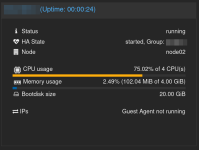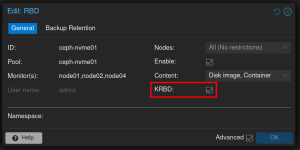As suggested by @fweber (@fiona), I’m starting a new thread to track this issue.
We’ve encountered a significant problem in PVE 9: VM boot times (using OVMF) have become extremely slow. It now takes roughly 1 minute and 30 seconds from hitting “Start” to seeing any console output or UEFI POST.
This issue wasn’t present in PVE 8.x — VM startup there was almost instantaneous by comparison.
During this delay, CPU usage is consistently high (around 75–80%, regardless of how many cores are assigned), and RAM usage hovers at about 100 MB.
Below are two screenshots showing the VM state during this stall:


And here's the config of one of the affected VMs — though we’ve confirmed the issue occurs on all VMs across all nodes in the cluster:
Some more information:
Here's the output I get:
I also checked the Ceph client configuration:
So there's no global override set either.
Just to clarify: this Ceph cluster was created and is fully managed by Proxmox VE (PVE-managed), no external cluster or manual Ceph deployment.
Could using KRBD be the issue?

Would you recommend manually setting the rbd_cache_policy to writeback for the EFI disk, or is there a more appropriate fix in PVE 9 for this scenario?
We’ve encountered a significant problem in PVE 9: VM boot times (using OVMF) have become extremely slow. It now takes roughly 1 minute and 30 seconds from hitting “Start” to seeing any console output or UEFI POST.
This issue wasn’t present in PVE 8.x — VM startup there was almost instantaneous by comparison.
During this delay, CPU usage is consistently high (around 75–80%, regardless of how many cores are assigned), and RAM usage hovers at about 100 MB.
Below are two screenshots showing the VM state during this stall:


And here's the config of one of the affected VMs — though we’ve confirmed the issue occurs on all VMs across all nodes in the cluster:
Code:
agent: 1
bios: ovmf
boot: order=virtio0
cores: 4
cpu: x86-64-v3
efidisk0: ceph-nvme01:vm-117-disk-1,efitype=4m,pre-enrolled-keys=1,size=528K
hotplug: disk,network
machine: q35
memory: 4096
name: <redacted>
net0: virtio=F2:AC:38:7B:9A:A6,bridge=vmbr0,tag=100
numa: 0
onboot: 1
ostype: l26
scsihw: virtio-scsi-single
smbios1: uuid=8b8a56a6-0684-4b2b-a50a-69b23b789235
sockets: 1
tablet: 0
tags: <redacted>
vga: virtio
virtio0: ceph-nvme01:vm-117-disk-0,discard=on,iothread=1,size=20G
vmgenid: 3890b812-a1fc-4331-a4c0-49d88c7632a6Some more information:
Bash:
root@node02 ~ # pveversion
pve-manager/9.0.0~11/c474e5a0b4bd391d (running kernel: 6.14.8-2-pve)
root@node02 ~ # qemu-system-x86_64 --version
QEMU emulator version 10.0.2 (pve-qemu-kvm_10.0.2-4)
Copyright (c) 2003-2025 Fabrice Bellard and the QEMU Project developersHi,
it is a known issue without using the proper cache mode, but Proxmox VE 9 should set the proper cache mode for the EFI disk: https://git.proxmox.com/?p=pve-stor...3cb0c3398c9fc19d305d9c36a74a4797715d009e#l564
What do you get when you query the cache mode for the image
?Code:rbd config image get vm-117-disk-1 rbd_cache_policy
Is this a PVE-managed or an external cluster? Do you maybe override the rbd_cache_policy in your Ceph client configuration or somewhere?
Here's the output I get:
Bash:
root@node02 ~ # rbd --pool ceph-nvme01 config image get vm-117-disk-1 rbd_cache_policy
rbd: rbd_cache_policy is not setI also checked the Ceph client configuration:
Bash:
root@node02 ~ # grep rbd_cache_policy /etc/ceph/ceph.conf /etc/pve/ceph.conf
root@node02 ~ #So there's no global override set either.
Just to clarify: this Ceph cluster was created and is fully managed by Proxmox VE (PVE-managed), no external cluster or manual Ceph deployment.
Could using KRBD be the issue?

Would you recommend manually setting the rbd_cache_policy to writeback for the EFI disk, or is there a more appropriate fix in PVE 9 for this scenario?
Last edited:

